Plants That Repel Mosquitoes: How to Use Them in The Wild
We’ve all been at one point or another attacked by a mosquito or two, and the truth is that they’re unbelievably annoying.
Besides, they also carry some dangerous viruses: just think of the West Nile or Zika. So you may be out in the wilderness and forget that precious insect repellant, or even in the comfort of your own home and seek a green solution.
[the_ad_group id=”21″]
That’s why it’s good to have an idea of what plants that repel mosquitoes you can use as a natural substitute. We’re here to let you know what these plants are and how they work, so read along.
These Are The Plants You’re Looking for
Without much further ado, let’s see which plants will give you more armor points in the fight against mosquitoes:
Basil
Also known as Ocimum Americanum, basil is filled with essential oils that act as a natural inhibitor of the mosquitoes activity.

If you manage to extract this substance and turn it into a spray, it will surely prove very effective, so here’s how you do it:
Materials
- 1 cup of green basil leaves.
- 100 grams of boiled water.
- 100 grams of vodka.
- 10 drops of essential oil made from basil; you’ll have to buy this, but it’s not a mandatory ingredient.
- Empty spray bottle.
Steps
- Put the leaves in a glass
- Add the water.
- Let the leaves steep for a few hours.
- Squeeze the leaves dry into a spray bottle.
- Add the vodka and the essential oil.
- Give it a good shake and apply on your skin.
So it’s that easy to fabricate a good anti-skitter repellant from basil, but you can use this in other ways too:
- Grow it in or around your house as a good preventative measure against insects.
- Crush green leaves and apply this on your skin before or even after you’ve been bitten.
Bee balm
Another plant that acts as a good barrier against mosquitoes, bee balm – also known as Monarda – is a flowering plant. As its name implies, it’s a balm for bees, because it attracts them thanks to a substance called geraniol, which incidentally is something mosquitoes hate.
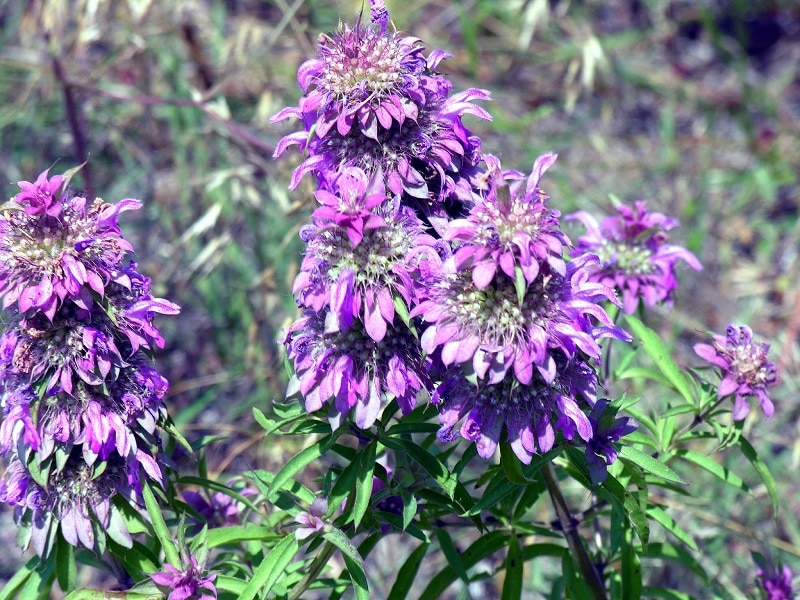
This substance is especially potent when you crush the leaves, but it also works well if you have some bee balm in your home or garden as a means of prevention. There are two ways in which you can use this plant as a good anti-mosquito armor:
The lotion
You can make a bee balm lotion and apply it directly on your skin. This works well if you are otherwise fully dressed with long-sleeved shirts and pants, but want to protect your face or hands.
Get some bee-balm essential oil, and mix 20 drops with 2 teaspoons of lavender oil. You can apply it immediately, but it’s advisable to let it steep a couple of hours so the substances mix well and do their charm. Apply on skin and say bye to mosquito bites.
The spray
To make this spray you’ll need:
- 1 cup of fresh bee balm leaves.
- ¼ cups of pure alcohol.
- ½ cups boiled water.
The steps you’ll have to take are:
- Crush the bee balm leaves in a glass.
- Add the water on top and leave it be for half a day.
- Put the mixture into a spray bottle.
- Add the vodka on top.
- Apply when needed.
Cadaga tree
This is one of the trees you can consider planting in your garden if you have space and if you live in the right place. It’s a wonderful tree, and since it’s from the Eucalyptus family, it basically has most of the same renown substances that make it work so well against insects.
However, you should only consider planting this tree if you have a large enough garden for it, and you don’t mind other animals that might be attracted to your property. Or if that bothers you, you can always get a taller fence.
This tree is huge, it grows to about 80 feet, and if you plant more, you’ll need to place them about 25 feet apart in full sun. Some shade can be tolerated too, but not very much and you should be living in mostly very warm weather, like somewhere near the equator or in the southern hemisphere.
How can you use this Cadaga tree outdoors?
- Get some of its leaves with you on your camping trip and burn them around the camp.
- Try camping in an area populated with these trees, it’s amazing.
Catmint
An extremely effective plant against mosquitoes, catmint works like a charm against mosquitoes and even spiders because of its natural substances. That’s because it contains:
- It’s a substance that works very well against microbes and bacteria.
- It gives catmint a very strong lemon odor, that keeps mosquitoes at bay.
- This is an alcohol that smells like roses which mosquitoes hate.
- These substances are known for their astringent and antiseptic characteristics, and they act by creating a protective layer on your skin. In case you’ve already been bitten by a mosquito, this will help calm down your itchiness and swelling.
There’s a simple way to use catmint to your advantage, and that’s making a spray out of it based on an infusion. You just have to boil the leaves and when the infusion has cooled down, apply it on your skin.
If you live in an area with a lot of mosquitoes, add more fresh catmint leaves and less water to get a more concentrated solution. Plus, it’s also wise to add some of this to your shower gel or shampoo so you can make sure you’re protected to a higher degree.
Catnip
We’ve all heard about catnip as a good way to make our cats giddy, but since this comes from the Mint family, it has certain substances and properties that work against mosquitoes as well as other insects.
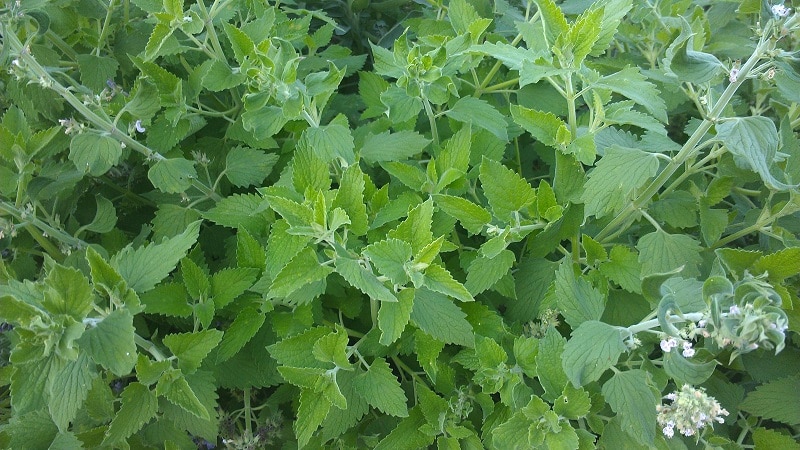
The ways in which you can use catnip against mosquitoes are:
- Grow it in your garden or in your home.
- Crush some green leaves and rub them on your furniture so that their odor is more poignant.
- Crush fresh leaves directly on your skin if there are mosquitoes around.
- Make a paste out of crushed catnip leaves and a bit of alcohol to apply on your skin.
- Boil some leaves in water, add some essential oil or olive oil and turn it into a cream.
- Add some concentrated catnip infusion to your showering and cleaning products.
Catnip works so well because it contains nepetalactone, an organic compound that is the main active ingredient. This works so well because of its chemical properties that affect the olfactive system of mosquitoes, and it’s so strong that it’s even better than DEET. And way less toxic.
Eucalyptus
A very well known plant, eucalyptus is yet to disappoint when it comes to its large array of medicinal uses. You can also make a reliable mosquito repellant out of it, or you can simply buy eucalyptus oil from any drugstore.
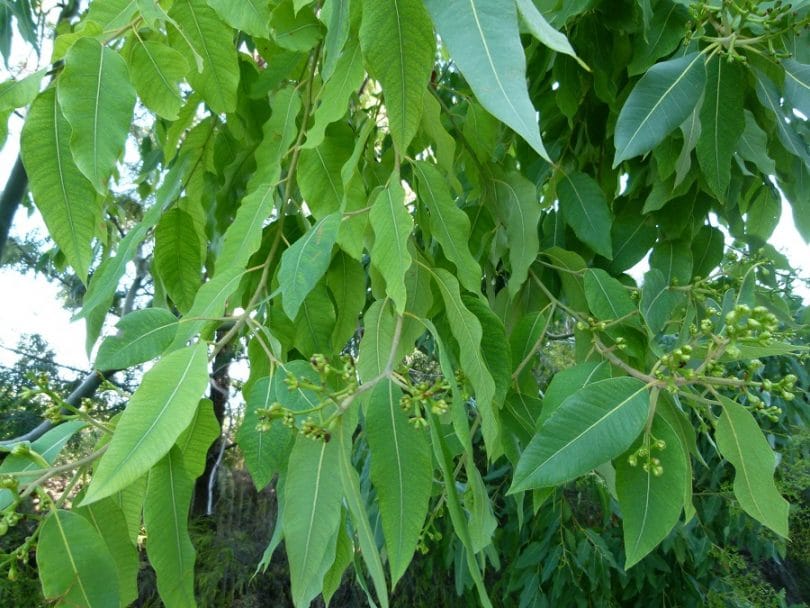
The materials you’ll need for the homemade eucalyptus essential oil are:
- 50 grams fresh leaves.
- 8 cups olive oil.
- Jar.
- Pot.
- Strainer.
The steps you should take are:
- Crush the leaves well in order to extract the oil.
- Put these leaves in the pot. Make sure to get a big one.
- Pour the olive oil in the pot.
- Cook this mixture over low heat for at least 5 hours.
- Use the strainer to strain the eucalyptus oil inside the jar.
- Secure the jar and store it in the refrigerator to use it as you need. It will be good for about a year.
Once you have this eucalyptus oil ready, you can find multiple uses for it, like:
- Add it to other mosquito repellant sprays.
- Mix it with apple vinegar to treat mosquito
- Burn it on decorative candles.
- Add it to your shower gel or body lotion.
- Apply it topically on your ankles and wrists before you’ve been bitten.
- Apply it on insect bites to make them heal faster.
- Put some on your clothes or outdoor equipment.
- Use it with other essential oils, like lavender oil.
Garlic
Since garlic is a well-known repellent against vampires of all kinds, it’s bound to work on other blood-sucking skitters like mosquitoes. That’s the main reason why we recommend it, but science backs us up too, given the useful substances found in this Allium sativum herb.

One of this substances is called allicin, and it’s the main active ingredient you’ll find in garlic. This works so well because it enters your blood stream and makes it repugnant to mosquitoes. So if you have a lot of allicin in your blood, mosquitoes and spiders are less likely to bite you.
But say they do: at this point allicin also works as an anti-microbial and will kill the viruses transmitted through the insect bite. Some news reports have even shown cases in which allicin worked against the West Nile Virus, a deadly virus carried by mosquitoes.
[the_ad_group id=”22″]
So how can you use garlic to your advantage?
- Get it into your blood stream fast by adding it to your food or by eating it raw.
- Rub some crushed garlic on the soles of your feet when you’re sleeping.
- Crush a few garlic cloves and mix them with lavender oil to make a paste. Apply it topically on affected areas or areas prone to mosquito
- Take some allicin supplements if your doctor recommends them.
- Cut or crush garlic and dab your furniture with it.
- Hang a few garlic cloves in your home, above doors and windows.
- Boil some garlic in water, and some strong alcohol like vodka or pure alcohol and put it into an empty spray bottle to spray directly on your skin.
- Make a garlic infusion and add that to your shower gel.
Lavender
We kept telling you about adding lavender oil to most of our other plant suggestions so you can make effective essential oils or sprays against mosquitoes. That’s because lavender itself has been known to act as a mosquito repellant, even though us humans and other animals actually find its fragrance quite appealing.
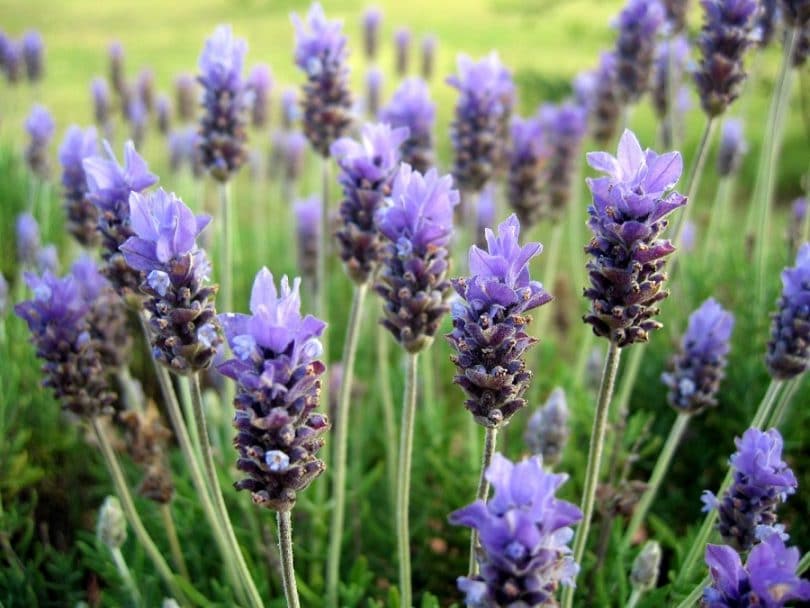
And that’s an important advantage, because when you apply lavender on your skin as a barrier against mosquitoes, you won’t feel self-conscious about its smell and be ashamed to go out in public.
This also comes from the Mint family, just like catnip, which is why it has similar properties. But unlike catnip, it’s wiser not to make a spray out of it because it loses some of its strength when it comes in contact with air.
See also: How Far do Mosquitoes Travel: Know Thy Enemy
So the best way to use lavender in your fight against mosquito bites is by applying it directly on your skin. And since it’s natural, it won’t harm you in any way. Plus it smells so nice that it can also make you quite sleepy – lavender is also known as a mild sedative and relaxant.
Use lavender by:
- Crushing it and applying topically.
- Mixing green leaves with essential oils or a few drops of olive oil and applying on your wrists and ankles.
- Adding a few drops of lavender essential oil to your usual body lotion or cream.
- Making some lavender oil from crushed leaves and olive oil, and then adding this to sprays made from citronella or catnip.
- Burning a few drops of this oil with the help of your decorative candles.
- If you can actually make candles out of scratch, add some lavender to your ingredients.
- Growing it in your garden and always having some in your house if you live in an area filled with mosquitoes.
Peppermint
We like peppermint because of its menthol-like fragrance, which is actually given by its main ingredient: menthol.
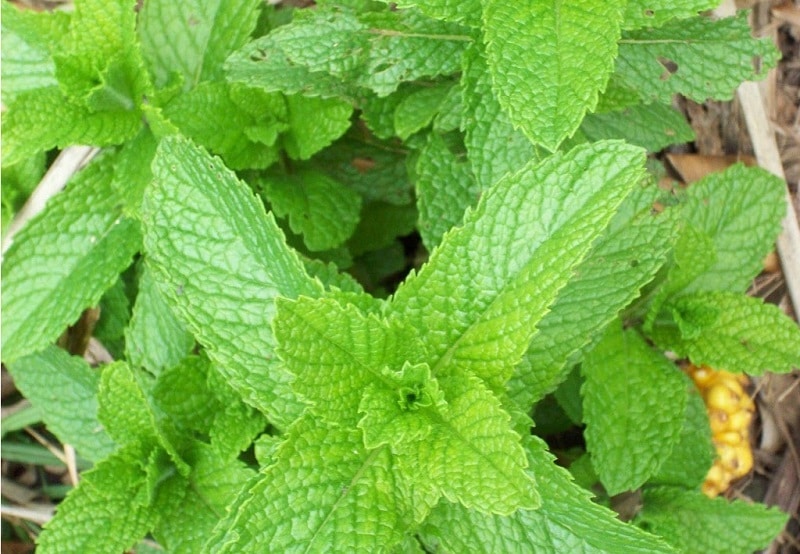
This is another odor that mosquitoes hate, and if you get it into your bloodstream by applying it topically, you’re in the clear. Much like the allicin contained by garlic, menthol will make your blood less desirable to your unwanted companions.
So you can use it by:
- Turning it into a spray by boiling it in water and then adding some pure alcohol to the mixture.
- Rubbing it directly on your skin, especially on the soles of your feet, ankles, and wrists. That’s where the blood circulation is more intense and you can make sure it’s easily absorbed into your bloodstream.
- Making a homemade essential oil from crushed peppermint leaves, lavender oil and a few drops of vodka.
- Adding some peppermint essential oil to your body lotion.
- Burning peppermint oil on candles – it’s so nice to do that outdoors.
- Crushing some peppermint leaves on your clothes, furniture or inside your tent if you’re outdoors.
Rosemary
We love rosemary too, especially because it looks beautiful. It’s a great addition to your home garden, but you can even grow it in pots in your home. And you can always add a few leaves to your food, it will make it taste delicious.
The good news is that rosemary works great against mosquitoes, whether from the flowerpot or on your skin.
You can turn it into a repellant with the following ingredients:
- 1 cup of rosemary leaves.
- ¼ cup of water.
- ½ cup of pure alcohol.
- 1 cup lavender oil.
The steps you should take are:
- Boil the rosemary leaves in water.
- Leave it be for a few hours.
- Get the leaves out.
- Add the alcohol on top of your infusion.
- Add the lavender oil and mix it well.
- Apply on your skin as needed.
You can also:
- Use the crushed leaves topically.
- Smudge crushed leaves on your camping equipment.
- Mix some crushed leaves with rosemary essential oil and apply on wrists and ankles.
Is There Anything Else?
These are the most common mosquito repellants made from plants, herbs and tree leaves, but nature has given us a whole lot of other options to use.
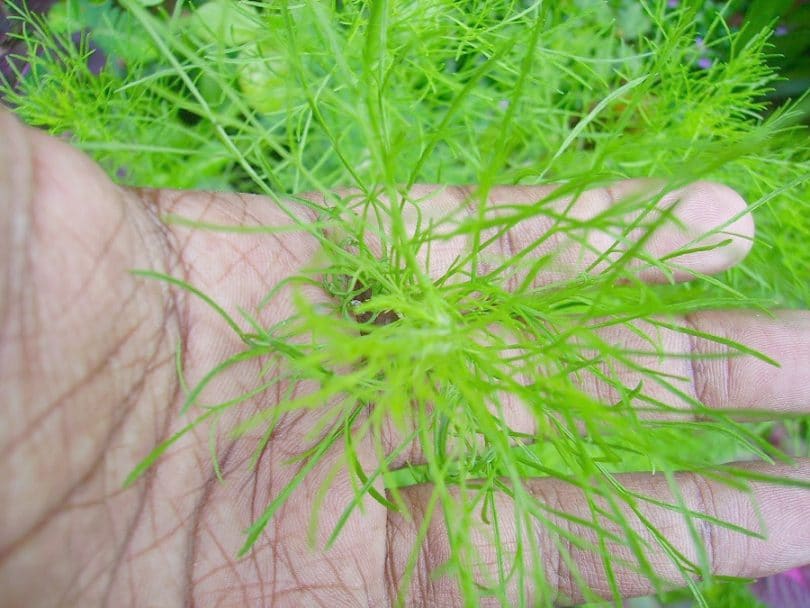
If you seek more ideas or want to ascertain which plants you already have in your garden, here’s a complete list:
- Ageratum.
- American Beauty Berry.
- Ash Juniper.
- Camphor Tree.
- Cedar.
- Chrysanthemums.
- Citronella Grass.
- Citrosa.
- Clove.
- Common Lantana.
- Dill.
- Floss flower.
- Geranium.
- Lemon Grass.
- Lemon Scented Geranium.
- Lemon Scented Verbena.
- Lemon Thyme.
- Lemon Verbena.
- Mexican Marigold.
- Mindanao Gum Tree.
- Mint.
- Neem Tree.
- Nodding Onion.
- Oregano.
- Osage Orange Tree.
- Pennyroyal.
- Pineapple Weed.
- Pitcher Plant.
- Pitcher Plants.
- Pyrethrum Daisy.
- Red-Flowering Gum Tree.
- Sagebrush.
- Sassafras Tree.
- Silver Dollar Tree.
- Snowbush.
- Stone root.
- Sweet Fern.
- Tansy.
- Tauroniro Tree.
- Tea Tree.
- Vanilla Leaf.
- Wax Myrtle Shrub.
- Wild Bergamot.
- Wormwood.
So How Does All this Help You in The Wild?
There are a few lessons you can take from this article, and you don’t need to learn all these plants, their ingredients, and instructions for use by heart.
The first thing we’d advise you to do is know your environment. If there are swarms of mosquitoes, a natural repellent may not be strong enough to keep you safe from their bites. Here’s our guide on how to make a homemade mosquito trap for you to try.
But it’s also important to know your environment because you’ll know what plants you’ll have around, and then research them and see if they repel mosquitoes.
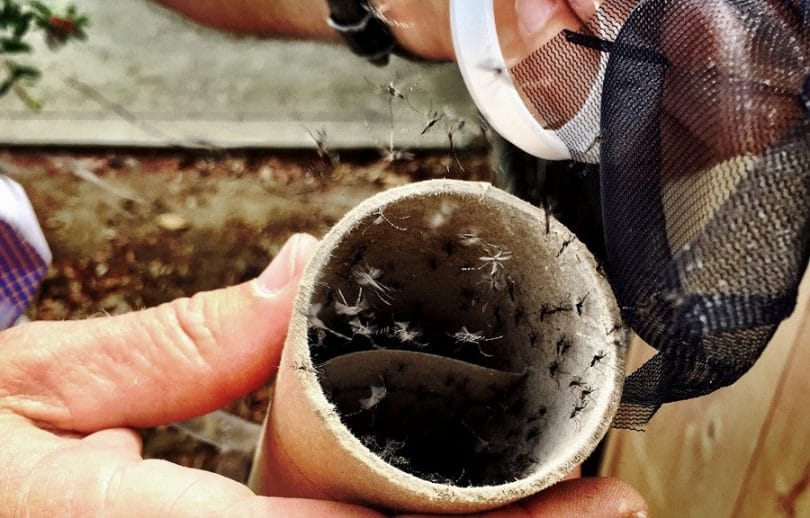
If they do, it’s easy to boil them in water and turn them into a spray right on the field, or even crush their leaves on your skin, clothes or tent. You can even burn them, but the topical application is more effective outdoors.
If you don’t have any useful plants around, you can always pick something from the list above and make your homemade mosquito repellent to take with you.
[the_ad_group id=”23″]
That being said, what sort of anti-mosquito herbs and trees do you have in your garden? Have you used them as a natural protection against insect bites? Did they work? Do check out our easy instructions on how to make a DIY repellent to protect you from these pests.
Do you prefer a DIY product or would you rather by an insect repellent? Tell us all about your experience in the comments below!

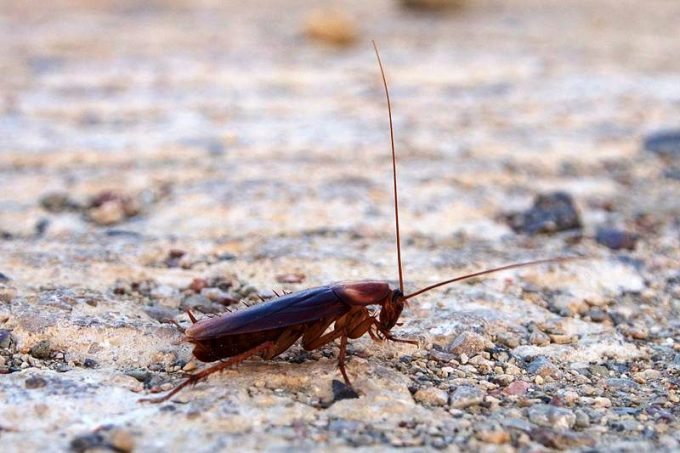





As a child, my mother used to rub peppermint oil or failing that, peppermint leaves on the side of the necks and wrists, essentially the places you’d usually apply perfume. Something I still find myself doing to this day when heading to areas I know are likely to have mosquitoes.
Peppermint can be found almost everywhere around the globe, so chances are, you’ll find it on many campsites and hiking trails, what’s more, you’ll probably be able to grow it in your garden or greenhouse. A word of warning, Peppermint is quite an aggressive plant in my experience and has a tendency to take control of the area in which it is planted and is frightfully hard to get rid of, therefore be sure to plant away from other plants and herbs.
Peppermint is one of the most accessible mosquito repellents out there – whether on the supermarkets or in the field. You can use this whenever you gain access to one. In addition, it is one of the mosquito repellents that do smell good and fresh.
As a child, my mother used to rub peppermint oil or failing that, peppermint leaves on the side of the necks and wrists, essentially the places you’d usually apply perfume. Something I still find myself doing to this day when heading to areas I know are likely to have mosquitoes.
Peppermint can be found almost everywhere around the globe, so chances are, you’ll find it on many campsites and hiking trails, what’s more, you’ll probably be able to grow it in your garden or greenhouse. A word of warning, Peppermint is quite an aggressive plant in my experience and has a tendency to take control of the area in which it is planted and is frightfully hard to get rid of, therefore be sure to plant away from other plants and herbs.
Peppermint is one of the most accessible mosquito repellents out there – whether on the supermarkets or in the field. You can use this whenever you gain access to one. In addition, it is one of the mosquito repellents that do smell good and fresh.
These plants, lemon grass, mint, sage and so on, are indeed quite good at repelling insects from themselves and from the skin when they are used to create repellent sprays and creams.
Unfortunately, however, their effectiveness is limited to a rather small area, so planting them in your garden is not likely to be enough to keep them out of your house. Though they will minimize them in your garden, but they certainly won’t keep them completely at bay.
If you’re planning to make your own repellents, then planting these is definitely beneficial, if not, it’s probably a waste of time and money in my humble opinion, unless, of course, you’re an avid gardener.
To be honest there are a lot of options, some even not mentioned in our article. However, mint, lemon grass, sage, peppermint, etc., can be used. Now, as a stationary mosquito repellent, Eucalyptus gets my recommendation because it is a tough tree and provides a wide (perhaps the widest) coverage due to the maximum size it can be.
These plants, lemon grass, mint, sage and so on, are indeed quite good at repelling insects from themselves and from the skin when they are used to create repellent sprays and creams.
Unfortunately, however, their effectiveness is limited to a rather small area, so planting them in your garden is not likely to be enough to keep them out of your house. Though they will minimize them in your garden, but they certainly won’t keep them completely at bay.
If you’re planning to make your own repellents, then planting these is definitely beneficial, if not, it’s probably a waste of time and money in my humble opinion, unless, of course, you’re an avid gardener.
To be honest there are a lot of options, some even not mentioned in our article. However, mint, lemon grass, sage, peppermint, etc., can be used. Now, as a stationary mosquito repellent, Eucalyptus gets my recommendation because it is a tough tree and provides a wide (perhaps the widest) coverage due to the maximum size it can be.
I grow eucalyptus plants and Cedar trees on my farm. I’m familiar with extracting oils from them. I grind up the leaves of Eucalyptus and mix them with 15% of rubbing alcohol. The other combination is cedar oil and rubbing alcohol. The latter is my favorite. I put them in a sprayer and apply them on my skin. It’s really important to be careful if you are allergic to some of the ingredients.
Eucalyptus comes close with Peppermint when it comes to the most preferred oils for mosquito repellents because of its scent and proven effectiveness. Cedar oil is also great to be combined with alcohol because the latter ingredient neutralizes the sharp tint of cedar oil and makes it milder. Overall, this is a great idea for a DIY repellent.
I grow eucalyptus plants and Cedar trees on my farm. I’m familiar with extracting oils from them. I grind up the leaves of Eucalyptus and mix them with 15% of rubbing alcohol. The other combination is cedar oil and rubbing alcohol. The latter is my favorite. I put them in a sprayer and apply them on my skin. It’s really important to be careful if you are allergic to some of the ingredients.
Eucalyptus comes close with Peppermint when it comes to the most preferred oils for mosquito repellents because of its scent and proven effectiveness. Cedar oil is also great to be combined with alcohol because the latter ingredient neutralizes the sharp tint of cedar oil and makes it milder. Overall, this is a great idea for a DIY repellent.